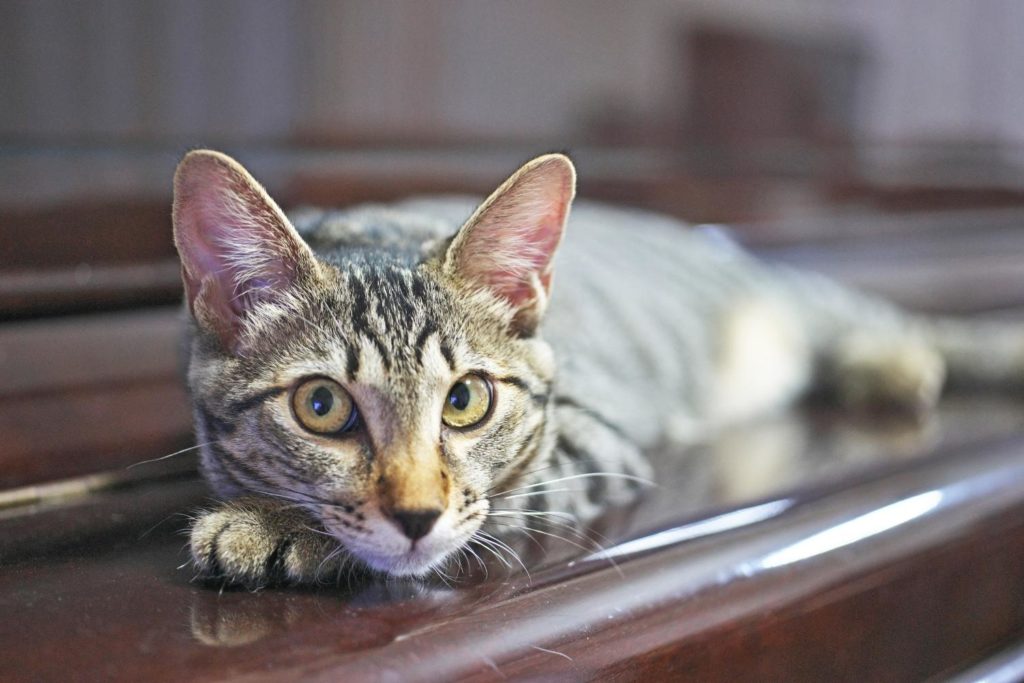
Cats normally lose their fur throughout the year. However, the amount is almost negligible. There are certain seasons where your cat would lose more fur than normal. This happens due to seasonal changes. However, if your cat is losing more than it should, it could be a sign of dry skin and irritation.
The prime causes of dry skin include food-based allergies, parasitic infection, mites, fleas, lice, & hormonal disorders such as thyroid disease.
So, what is the best cat food that can help alleviate the dry skin symptoms in your cat? But, before getting the best cat food for dry skin, we need to learn the basics.
| Image | Brand | Price | Prime | Buy |
|---|---|---|---|---|
 Top Top | Castor & Pollux | PrimeEligible | Buy Now | |
 Top Top | Purina Beyond | PrimeEligible | Buy Now | |
 Top Top | Castor & Pollux | PrimeEligible | Buy Now | |
 Top Top | Tender & True | PrimeEligible | Buy Now | |
 Top Top | Tender & True Pet Nutrition | PrimeEligible | Buy Now |
In case you are looking for food for a kitten then our resource best cat foods for kittens help you to choose the right one, which can provide the required nutrition to your little furkid.
What Makes the Cat’s Skin Dry?
Like humans, cats also need hydration to ensure the resilience and elasticity of the skin. When surrounded by low humidity, the cat’s skin loses its moisture. Mostly, this is noticed during the peak period of winters. Dry skin could also result from the lack of grooming due to arthritis and obesity issues.
This problem is observed in both young as well as adult cats. It’s also important to keep track of what goes inside your cat’s body, or it might result in dry skin. Plan your cat’s diet after consultation with a veterinarian.
Giving frequent hot baths to your cat will also result in skin irritation.
Ingredients to Avoid in a Dry Skinned Cat’s Food
Even though homemade foods are made with all the love and best of intentions, they’re not enough to prevent your cat from having dry and flaky skin. Commercial foods assure a balanced and complete diet for your cat but often end up doing less than they claim.
Ensure not to feed dry foods to the cat as it will reduce the moisture intake in your cat’s body.
Do not feed cat food that’s high in chemically synthesized preservatives or additives. We are not stressing to feed only natural elements as not all cats can produce essential vitamins in their bodies.
You’ll have to introduce added antioxidants and vitamins to take care of the daily nutrition intake.
Which Ingredients Keep Your Cat’s Skin Moist?
Now let’s find out some of the necessary elements you involve in your cat’s diet. Draft a healthy and balanced diet for your cat, leading to healthy and moist skin. It’s strongly advised to ensure regular zinc and omega-3 fatty acids intake.
Your cat’s diet must also have a surplus of protein sourced from fish, poultry, and meat. Feeding them canned food or wet cat food will ensure a regular moisture supply to your cat. It’ll make your cat’s skin moist and supple.
How Can Organic Food Help?
As cat owners, we want to provide only the best nutrition to our cats. Switching to organic food is one of the ways to make sure our little feline friend is blessed with a longer and healthier life. Organic food is free of chemical fertilizers, pesticides, growth hormones, antibiotics, or preservatives.
The absence of cheap raw materials also makes it the best option you could go for. In addition, organic food will protect your cat’s skin from unwanted irritation and inflammation, further preventing hair fall and dryness of the skin.
Is Home-Cooked Cat Food Better for Dry Skin Issues?
The best part about feeding homemade meals to your little furry friend is that the food is free of any preservatives and additives. They are safe to use, and you do not have to worry about any side effects. Unfortunately, not all cats react to change similarly.
Your cat might be more sensitive than the others when they’re suddenly introduced to new packed foods. So, it’s better to stick to home-cooked foods. In that way, you can successfully include sufficient moisture in their meals, which will prevent dryness or inflammation of the skin.
What Can I Feed Other Than kibble?
Instead of kibble, you can successfully feed your cat with home-cooked meals prepared with love. Kibble has a lower content of moisture as compared to homemade food. You have to be aware of certain essential elements to make a balanced and complete meal.
As you’ll have full control over what ingredients to include in your cat’s meal, you can leave out a food item that makes your cat’s skin dry.
Instead, prioritize items such as vitamins, minerals, and meat that will cater to your cat’s daily nutrition requirements. Home-cooked cat food can also be stored for a longer time than kibbles. Packed with moisture, cat food will not only keep your cat’s skin supple and smooth but also will enhance kidney health.
Does My Cat Need Treatment of Dry Skin?
Your cat’s dry skin condition cannot always be because of internal issues. It can sometimes be external too. In such cases, your cat will need additional skin treatment along with proper food. Tick and flea topical treatments will eliminate flea infestations from your cat’s body, resolving the issue.
Also, make sure to brush your cat’s fur regularly as it’ll help spread natural oils released from the skin.
In case of serious skin conditions, you will have to take the help of a veterinarian for medication. Finally, remember that shampoos should only be used to rinse excessive grease and dirt from your cat’s skin. Frequent usage of chemical products will deprive your cat of hydration.
Homemade Remedies for Dry Skin Cat
Now that you know the perks of feeding your cat with home-cooked meals. Let’s dive into some of the interesting and effective remedies you can easily prepare at home.
1. Include supplements
Fish oil and omega-three fatty acids are some of the good supplements that you must include in your cat’s diet for better skin. Lack of EPA and DHA will make your cat’s skin dry. Fatty acids will promote healthier skin and will also reduce allergic symptoms.
Mussel oil, fish oil, and krill oil are major sources of fatty acids. Unlike other animals, cats cannot convert ALA into DHA and EPA, so they need to be fed supplements.
2. Apple Cider Vinegar
If your cat’s skin inflammation is due to flea infection, we bring you one of the best and most effective solutions. It’s a lesser-known fact that apple cider vinegar is something that fleas hate.
So, rinsing your cat with a combination of warm water and vinegar will help eliminate the fleas.
Another way to use it is by spraying the solution directly into your cat’s fur and leaving it on for a couple of minutes. And then rinse off with water. You’ll start noticing the result after the first bath.
3. Natural moisturizer
Being a completely natural form of saturated fat, coconut oil will act as a lotion and give a soothing feeling to your cat’s itchy skin. Take a few drops of coconut oil and massage your cat’s coat very gently.
Apart from that, you can also include coconut oil in your cat’s diet as a natural fat supplement. However, it’s important to keep in mind that coconut oil will result in a spike in calorie intake, which is not necessary if your cat already has a balanced diet.
4. Involve minnows
Are you looking for treats that your cat will enjoy binging on? Well, then you should probably include minnows in your cat’s diet. Apart from being a delicious treat, minnows also possess features such as anti-inflammatory, lubrication for joints, and bringing shine to your cat’s fur.
In addition, omega-3 fatty acids present in it will relieve allergies and save your little feline friend from itchiness and dryness of the skin.
When is it Necessary to See a Veterinarian?
Home remedies might not always work in case of severe infections. So, it’s advised to talk to your veterinarian when nothing works. Taking professional assistance will help you figure out the main source of itchiness and dryness of the skin. In addition, there might be some underlying issues that are not visible to a novice’s eye.
Dry, flaky, and poor skin conditions might result from several internal issues, which you shouldn’t take lightly. Toxins not being filtered out properly by the cat’s body could also cause dry and flaky skin issues. And only a veterinarian can identify and give the best pieces of advice on this matter.
Follow the direction of your vet and take appropriate measures to treat the problem. The moment you start developing doubts in your mind and begin to question your cat’s routine, contact a veterinarian as soon as possible.
Recommended Resources for You
Conclusion
It’s very common among cats to develop dry skin because of the reasons mentioned above. As a pet owner, you must act responsibly at such times and take appropriate measures. Legend has it; prevention is always better than cure.
We hope this article could enlighten you on the habits you should probably quit and provide you an insight into the treatments available for dry-skinned cats.
Keep an eye out on your cat’s behavior, and get him treated as soon as possible to prevent their discomfort. Lastly, we wish your little furry friend a longer and healthier life.
